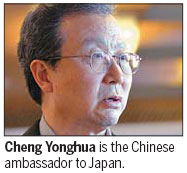A diplomat on the front line
Updated: 2013-03-11 08:05
By Zhao Shengnan (China Daily)
|
|||||||||||
Ambassador to Japan still hopeful of reducing tension over islands
As diplomatic postings go, being China's ambassador to Japan in recent months was not the easiest position, but tension over the Diaoyu Islands never diminished Cheng Yonghua's determination to address and solve the crisis.
Both countries have kept channels of communication open "despite the atmosphere being sometimes not so friendly," Cheng said diplomatically, mustering the experience of a veteran who has been working in Japan for more than two decades.
Japanese non-governmental economic groups, including the Japan-China Economic Association and the Japan Association for the Promotion of International Trade, will visit China soon in an effort to break the deadlock, the ambassador said on the sidelines of the annual session of the 12th National Committee of the Chinese People's Political Consultative Conference.
|
 |
Relations between the two neighbors chilled after Japan illegally "purchased" part of the islands in September. China vigorously protested against the deal and strengthened regular patrols around the islands in the East China Sea.
Japan's main political parties sent prominent envoys to China in January to ease the tension. But the Shinzo Abe administration, which came to power in December, has seemed at times recalcitrant and reluctant to engage in the issue constructively, analysts have said.
Cheng, also a top political adviser, called on Tokyo to show more "sincerity" and a "sense of urgency" to work together with China over the issue.
"Neighbors, who cannot move away from each other, should not keep quarreling all the time".
Foreign Minister Yang Jiechi also urged Japan on Saturday to work with China to prevent the tension from escalating or even "getting out of control".
The tension has soured public attitudes.
According to the Japanese Cabinet Office's annual survey in November, 80.6 percent of those questioned said they harbored no sense of friendship toward China, an increase of 9.2 percentage points from 2011.
"However, I think there is a growing voice in Japan to improve ties with China. After all, it needs access to the huge China market as it tries to boost its sluggish economy," Cheng said.
Trade last year between the world's second- and third-largest economies fell for the first time in three years, according to the Japan External Trade Organization. Japan's exports to China dropped 10.4 percent year-on-year to $144.8 billion.
When asked whether China should implement economic sanctions against Japan's export-oriented economy, Cheng said continued communication is the right option while a lack of understanding is just one of the reasons for today's impasse.
Exchange trips, especially for the youth of the two countries, will help lay the foundations for better relations, he said.
The Japanese know too little about modern China, while some Chinese people had an archaic image of Japan.
"It is a natural response for Chinese people to stop buying Japanese products when their patriotic feelings have been hurt, but the country still needs to cooperate with the outside world, including Japan, especially in the fields of environmental protection and energy saving technology," he said.
"If conflict happens, nobody will benefit from it. Japan, which benefited from post-war pacifism with its incredible economic growth, should know this better than anyone," he said.
zhaoshengnan@chinadaily.com.cn
Related Stories
Chinese ambassador to Japan optimistic about ties 2013-03-03 21:17
Chinese Ambassador to Japan delivers a speech 2012-07-02 15:40
Japan urged not to escalate tensions over Diaoyu 2013-03-09 12:16
Patrol keeps watch on Diaoyu Islands 2013-03-06 17:03
All Japanese activities regarding Diaoyu Islands illegal 2013-02-25 20:15
Today's Top News
Police continue manhunt for 2nd bombing suspect
H7N9 flu transmission studied
8% growth predicted for Q2
Nuke reactor gets foreign contract
First couple on Time's list of most influential
'Green' awareness levels drop in Beijing
Palace Museum spruces up
Trading channels 'need to broaden'
Hot Topics
Lunar probe , China growth forecasts, Emission rules get tougher, China seen through 'colored lens', International board,
Editor's Picks

|

|

|

|

|

|





